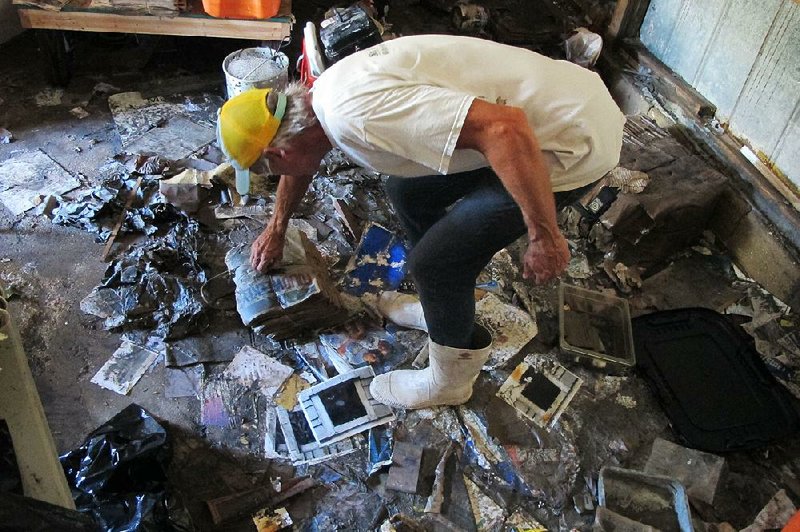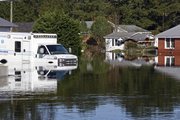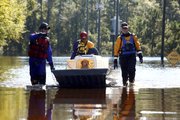TARBORO, N.C. -- Princeville, a historic town of about 2,000 that's considered one of the oldest chartered by blacks in the U.S., was devastated in 1999 by Hurricane Floyd's torrential rains, and it has started flooding again after Hurricane Matthew.
RELATED ARTICLE
http://www.arkansas…">Aid for Haitians rolls in, reaching isolated regions
Officials said water was flowing around a dike that protects the town, and aerial photos from Thursday show brown water surrounding many homes and buildings. Still, forecasters and authorities are hopeful that the river level will fall before causing a failure of the dike.
At a news conference Thursday afternoon, North Carolina Gov. Pat McCrory said Princeville was under water.
"We're going to have a lot of work to do," McCrory said. "We're going to have to rebuild a town."
[ MATTHEW’S IMPACT: Map of flooding so far]
The flooding triggered by heavy rain from Matthew -- which killed more than 500 people in Haiti -- has left at least 38 dead in the U.S.
McCrory said the number of power failures in the state was down to about 55,000, from a high of nearly 900,000 when the storm hit last week. He reported that the death toll had climbed to 22.
He said flooding continues to be a problem in poor areas in the eastern part of the state.
"It's a surreal experience to see this on a sunshiny day," McCrory said.
Amanda Brown and her fiance, David Corey, fear the worst for the mobile home where they live with their 7-year-old son.
"The water didn't come up until a day ago. We've been watching: No water in Princeville, no water in Princeville. Now, it's coming," she said, standing about 100 yards from an orange "High Water" sign and a cluster of law enforcement vehicles blocking a bridge into Princeville.
They don't have flood or renters' insurance, she said, so they're hoping the Federal Emergency Management Agency can reimburse them for clothes, food or hotel accommodations.
Theodore Rowe moved from Princeville to the outskirts of nearby Tarboro after Floyd hit in 1999. He said his current neighborhood hasn't flooded, and he went down to the river Thursday to see how high it had risen.
"I used to live in Princeville when Floyd came. That's why I left. I said I'd had enough of it," said the retired Marine Corps drill sergeant who has lived in the area for about 30 years. "The last time this happened, it was two weeks before we could get back. When we got back, the house had made a 180-degree turn. It faced the street, but when we went back, the back of it was facing the street."
Floyd roared ashore on Sept. 15, 1999, not long after another hurricane saturated the state. Two days later, the rising Tar River engulfed Princeville in water that was 20 feet deep near the town hall.
Princeville's history as one of the country's first towns created by freed slaves in 1865 helped boost a rebuilding effort. FEMA gave $26 million to Princeville's residents and another $1.5 million to the town.
Brown grew up in the area, and her family's home in Tarboro flooded after Floyd. She later moved into Princeville, figuring that kind of flooding was a once-in-a-lifetime event.
"I mean, they say every hundred years. We're not close to it. It hasn't even been 20 years," said Brown, who works at a CenturyLink call center.
From Florida and Georgia to the Carolinas, flooding from Hurricane Matthew was taking its toll. Many Americans don't have flood insurance -- some because they don't want to pay for it, some because they don't see the need for it.
As of August, only 19 percent of homeowners in Florida had flood insurance, 2 percent in Georgia, 9 percent in South Carolina and 5 percent in North Carolina, according to FEMA. Even in high-risk flood zones where homes are required to have coverage, the rate in those states ranged from 25 percent to 65 percent.
While banks require homes in high-risk zones to have flood insurance, a lot of flooding takes place outside of those designated hazard areas.
That was the case when storms flooded parts of South Carolina last year and an unnamed storm recently inundated the Baton Rouge area in Louisiana. The damage in Baton Rouge was put at $660 million, and most people there had no flood insurance.
"Flooding is the most common and costly disaster we see in the United States," said FEMA spokesman Rafael Lemaitre. Flood claims have averaged more than $1.9 billion per year since 2006, according to federal officials.
Walter Coker's fish camp on the Matanzas River in Crescent Beach, Fla., was inundated. The 4-foot surge destroyed a warehouse on the property where he stores furniture imported from Indonesia. The boat slips he rents out were torn apart, with the huge wooden pilings used to hold the docks jerked out of the river bottom. Floodwaters inundated his bait and tackle shop.
Coker doesn't have flood insurance.
"I did look into it. It would've been very expensive," he said. "It's one of those things you don't buy it on something you don't think will happen."
Homeowners without flood insurance may qualify for federal grants for shelter and food, but those are typically small sums and aren't meant to replace all losses. Homeowners also can apply for low-interest disaster loans, which must be repaid.
Information for this article was contributed by Kelli Kennedy, Russ Bynum, Jason Dearen and Meg Kinnard of The Associated Press.
A Section on 10/14/2016



